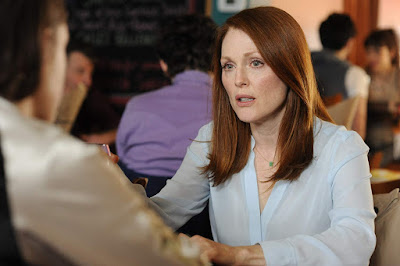Alice Howland (Moore) is a linguistics professor at Columbia University, and has enjoyed great academic success with her textbook 'From Neurons to Nouns', which has quickly become the most-used text by institutions worldwide.
When she starts to forget words and concepts in her lectures, and gets lost one day while jogging around campus, she makes an appointment with a neurologist, Dr. Benjamin (Stephen Kunken).
After a series of tests and scans, it emerges that Alice - who turns fifty at the beginning of the film - has a rare form of early-onset Alzheimers Disease which is genetically inherited.
 |
| Alice (Julianne Moore). |
Alice's deterioration increases by the day. Always by her side, her husband John (Alec Baldwin) is ever supportive. But it is daughter Lydia who seems to be the most affected by her mother's diagnosis, and the two of them grow closer than they have ever been before.
The screenplay, written by co-directors Richard Glatzer & Wash Westmoreland - adapted from Genova's novel - is, in a word, brilliant. Every single character is filled with their own conflicts, both internal and external, and the reality of the story and drama experienced by the characters is intense and palpable. There are occasional moments of humour, but overall, the story is a tragedy, but one that shows the strength of familial bonds and love, and the power of the human spirit.
 |
| John (Alec Baldwin) and Alice (Julianne Moore). |
Denis Lenoir's cinematography is beautiful; it helps that the landscapes of the location shoots are incredibly photogenic. But his command of light and dark, and contrast thereof, is magnificent. There are several moments where the camera transitions to Alice's point-of-view, and these become shakier and more unsettling as the film goes on.
But it is clearly the performances of the cast that make this film as powerful and affecting as it is. Julianne Moore is amazing in the titular role, and performs with such tenderness and realism that I found myself being drawn into the story from beginning to end. The high standard of her craft was acknowledged when she was not only nominated for, but won, the Academy Award for Best Actress. Not only that, but she earned the so-called Quintuple Crown: Academy Award, Golden Globe Award, Screen Actors Guild Award, Critics' Choice Award and the BAFTA Award.
 |
| Lydia (Kristen Stewart). |
Directors Richard Glatzer & Wash Westmoreland have made a truly beautiful film here, one that I have now seen more times than I could care to count (and will probably watch for many more times in years to come). Their handling of the subject matter is respectful above all else, and they both display knowledge and experience of appropriate pacing, tension and drama.
You absolutely must see this film as soon as possible if you haven't (or even if you have).
10 out of 10.

No comments:
Post a Comment